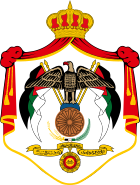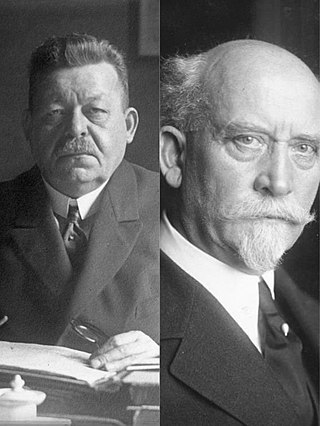 |
|---|
|
General elections were held in Jordan on 19 October 1961. [1] As political parties were banned at the time, all candidates ran as independents. [2]
 |
|---|
|
General elections were held in Jordan on 19 October 1961. [1] As political parties were banned at the time, all candidates ran as independents. [2]

Federal elections were held in Germany on 19 January 1919, although members of the standing army in the east did not vote until 2 February. The elections were the first of the new Weimar Republic, which had been established after World War I and the Revolution of 1918–19, and the first with women's suffrage. The previous constituencies, which heavily overrepresented rural areas, were scrapped, and the elections held using a form of proportional representation. The voting age was also lowered from 25 to 20. Austrian citizens living in Germany were allowed to vote, with German citizens living in Austria being allowed to vote in the February 1919 Constitutional Assembly elections.

Folketing elections were held in Denmark on 3 April 1939, except in the Faroe Islands where they were held on 19 April. They followed a dissolution of both chambers in order to call a referendum on changing the constitution. The referendum was held on 23 May but failed due to a low voter turnout. The result of the elections was a victory for the Social Democratic Party, which won 64 of the 149 seats. Voter turnout was 79.2% in Denmark proper and 47.8% in the Faroes.

Parliamentary elections were held in Ghana on 29 December 1992, the first since 1979. Voter turnout was just 28.1% amidst a boycott by opposition parties, who had claimed the preceding presidential elections in November – won by former military ruler Jerry Rawlings with 58% of the vote – were fraudulent, with international observers considering them not to have been conducted in a free and fair manner.

General elections were held in Venezuela on 1 December 1963. The presidential elections were won by Raúl Leoni of the Democratic Action political party, who received 32.8% of the vote. Leoni's party won 66 of the 179 seats in the Chamber of Deputies and 22 of the 47 seats in the Senate. Voter turnout was 92.3% in the presidential election and 90.8% in the Congressional elections.

General elections were held in Venezuela on 7 December 1958. The presidential elections were won by Rómulo Betancourt of Democratic Action, who received 49% of the vote, whilst his party won 73 of the 132 seats in the Chamber of Deputies and 32 of the 51 seats in the Senate. Voter turnout was 93% in the presidential election and 92% in the Congressional elections.

General elections were held in Puerto Rico on 5 November 1996. Pedro Rosselló of the New Progressive Party (PNP) was re-elected Governor, whilst the PNP also won a majority of seats in the House of Representatives and the Senate. Voter turnout was between 80% and 82%.

General elections were held in Venezuela on 3 December 1978. The presidential elections were won by Luis Herrera Campins of Copei, who received 47% of the vote. Although Copei received more votes, Democratic Action won the most seats in the Chamber of Deputies, whilst the two parties won 21 seats each in the Senate. Voter turnout was 88%.

General elections were held in Turkey on 21 July 1946, the first multi-party general elections in the country's history. The multiple non-transferable vote electoral system was used. The result was a victory for the Republican People's Party, which won 395 of the 465 seats. This election was held on the basis of open voting, secret counting and majority system, with the exception of judicial supervision. Due to these irregularities, it has also been referred to as a "fraudulent election".

General elections were held in Bolivia on 9 July 1978. The elections were the first held since 1966, with several military coups taking place during the late 1960s and early 1970s. Although Juan Pereda of the Nationalist Union of the People won the presidential elections according to official statements, more votes were cast than there were registered voters. After examining a number of allegations of fraud and other irregularities, the National Electoral Court decided to annul the results on 19 July. The following day, Pereda was installed as President following a military coup. Pereda himself was overthrown by yet another military coup in November, which saw General David Padilla assume the presidency. Fresh elections were held the following year, with Padilla transferring power to his democratically elected successor, Wálter Guevara.

General elections were held in Bolivia on 3 July 1966. René Barrientos of the Front of the Bolivian Revolution (FRB) was elected president with 67% of the vote, whilst the FRB won a majority in both houses of Congress. James Dunkerley describes the election as not free and fair since a major segment of the opposition was excluded from participating.

General elections were held in Jordan on 29 August 1951. As political parties were banned at the time, all candidates ran as independents, although some affiliated with the Jordanian Communist Party, the Ba'ath Party the Arab Constitutional Party and the Umma Party all won seats.
General elections were held in Lebanon between 23 August and 11 October 1992, the first since 1972. Independent candidates won the majority of seats, although most of them were considered members of various blocs. Voter turnout was 30.3%.

General elections were held in Lebanon between 27 August and 3 September 2000 to elect the 128 members of the Parliament of Lebanon. Independent candidates won the majority of seats, although most of them were considered members of various blocs. Voter turnout was 40.5%.

General elections were held in Puerto Rico on 3 November 1992. Pedro Rosselló of the New Progressive Party (PNP) was elected Governor, whilst the PNP also won a majority of seats in the House of Representatives and the Senate. Voter turnout was between 82% and 84%.

General elections were held in Italy on 29 October 1882, with a second round of voting on 5 November. The "ministerial" left-wing bloc emerged as the largest in Parliament, winning 289 of the 508 seats.

Parliamentary elections were held in Brazil on 15 November 1978. The pro-government National Renewal Alliance Party (ARENA) won 231 of the 420 seats in the Chamber of Deputies and 15 of the 23 seats in the Senate. Voter turnout was 82%.
Presidential elections were held in Colombia on 10 February 1914. They were the first direct presidential elections since 1860. The result was a victory for José Vicente Concha of the Conservative Party, who received 89.1% of the vote. Vicente took office on 7 August.
Presidential elections were held in Colombia on 9 February 1930. The result was a victory for Enrique Olaya Herrera of the Liberal Party, who received 44.9% of the vote. He took office on 7 August.
Parliamentary elections were held in Colombia on 16 September 1951 to elect the Senate and Chamber of Representatives. Although the Liberal Party boycotted the elections, some Liberals from the Populares faction did stand. As a result of the boycott, the seats reserved for the minority party were left vacant, whilst the Conservative Party won the remainder.
Parliamentary elections were held in Colombia on 16 March 1958 to elect the Senate and Chamber of Representatives. They were the first elections held under the National Front agreement, which only allowed the Conservative Party and the Liberal Party to contest the elections, and allocated 50% of the seats in both houses to each party. As a result, the main contest at the elections was between factions within each party.